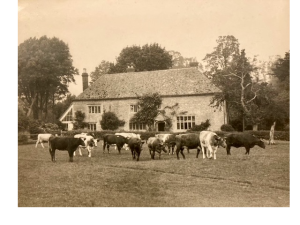
Cyril Connolly and Horizon Magazine
by William Loxley | November 26, 2017
Back in September, I was browsing The Last Bookshop on Walton Street when I came across a sun-damaged stack of Horizon magazines. The covers were simplistic; only the colour of the logo changed with each issue between brilliant greens, blues, pinks and purples. The economical design seemed evocative of the 1940s, a decade of austerity and strict rationing, and, like the paperbacks of Allen Lane’s Penguin, the sole purpose was the dissemination of good reading material.
In the ten years that it was active, Horizon forged a space like a playground for writers, its greatest asset being that its editor, Cyril Connolly, in no way enforced a uniformity of genre, style or tone. He had envisioned a magazine that would ’embrace the new and untried’ and bring definition to the Thirties and Forties as an era of literary reinvention. Believing that previous generations had made prose too artful and whimsical, he promoted a more natural confluence of form and content. He chose stories, poems and essays on the strength of the content, whether their creators were known or unknown, young or old. Writers like George Orwell and Christopher Isherwood, with their dynamic, realist styles, were heaved up to the surface of British culture.
Connolly worried deeply about the future of British writing, fearing that war would so change the emphasis of modern society that literature and the arts could no longer be deemed matters worthy of consideration. The visceral and brutal reality of war, as well as the bureaucracy that attended it, presented ‘a humiliating position for idealists’ and threatened the ability of artists to remain spiritually alive. It was ‘the enemy of creative activity’ and Connolly invited writers to ignore it entirely. Horizon was his personal contribution to the conflict because it made culture ‘something worth fighting for.’ It sent out the message that art was not a luxury but a necessity, and it could not be pushed aside until the war was over.
Editing manuscripts and proofs in the Café Royal and hosting lively parties for authors, Connolly created a tight community of writers with himself at the centre. Horizon had taken a gamble at a time of uncertainty and managed to fill a space left by T. S. Eliot’s Criterion and two influential poetry magazines, New Verse and Twentieth Century Verse, which had folded early in 1939. New issues appeared on shelves like clockwork each month despite the immense difficulties of life on the home front, and business proceeded as usual at Horizon’s Bloomsbury headquarters during the Blitz. At its height the magazine had a circulation of 10,000. To novelist Anthony Powell, it was ‘something of a beacon during the war’.
Remaining spiritually alive was something Connolly personally had been struggling with for years. He was known for his ‘stimulating’ book reviews in the New Statesman, but not for his own novel, The Rock Pool (1936). This was the opposite of his intentions; journalism, for him, represented ‘much hack-work and little money’ and Connolly hated the idea that he was destined for it. He had been seen as a young man of great promise. At Eton, though he was in no way popular and possessed a round, flat face that lead one student to ask if he had been ‘kicked in the face by a mule’, Connolly was elected to the elite student society “Pop”, a supposedly impossible feat for an unathletic scholarship boy. He had then gone on to win the enormously prestigious Brackenbury History Scholarship to Balliol College, and for the rest of his life, these achievements formed the watermark against which all others were measured. He grew increasingly convinced that ‘the true function of a writer [was] to produce a masterpiece’. But, as Anthony Powell remarked, though a ‘natural’ writer Connolly was not a poet or a novelist. Failing to follow up on his early successes with that masterpiece, he struggled through protracted bouts of melancholia in which he despaired at being ‘a lazy, irresolute person, overvain and unmodest’. Nevertheless, he remained a deeply discerning critic, with bold, new ideas.
The overall structure of the Horizon project was philanthropic; in the January 1941 issue, they famously introduced the “Begging Bowl”, calling on readers to help the magazine by finding new subscribers, and to help contributors by sending them money. This was a lifeline for some of its newer writers, who were in constant need of funds. Dylan Thomas had been developing a terrific problem with booze, and the idea of the “Begging Bowl” was inspired by a campaign to save him from the brink of financial ruin. Thomas’ insatiable appetite for London’s pubs lead to perennial debt. But he would regularly turn up on the doorstep at the Horizon office where Connolly would buy his poems with cash on the spot ‘as if they were packets of cocaine’. The magazine’s unerring faith in Thomas, which would at times have appeared nothing short of stupidity, eventually paid off. In 1945 they published ‘Fern Hill’ and ‘A Refusal to Mourn the Death, by Fire, of a Child in London’, now two of his best-loved poems. Connolly was taking risks and they were paying off; the public was engaged.
George Orwell was similarly afforded the full support of the magazine’s editor, despite focusing on popular culture in his essays. In accepting Orwell’s ‘Boys’ Weeklies’ about the adventure stories featured in twopenny papers for children, Connolly risked alienating the magazine’s high-brow following. But he had the courage to back his convictions, and when the essay appeared, it was accompanied by a note stating boldly that a monthly review should encourage authors ‘to write on subjects about which their feelings are deepest’. Thus began Orwell’s long relationship with the magazine, the first of its kind that allowed him to write with the singularity that characterises his best essays.
The magazine ran until 1949, continuing to invest in new writing and cultivate fruitful working partnerships with the same dexterity as before. Eventually, however, Connolly realised that established writers were beginning to send their work to America where money was more forthcoming, and it was time to move on.
Sadly, the success of Horizon was not enough for Cyril Connolly. It had been, at one time, when the world of journalistic hack-work eddied around him—a depressing contrast to the great ambitions that had been predicted for him and that he himself had held. But against his Eton triumphs, all else still paled in comparison. For both its readers and contributors, however, Horizon represented an intellectual and spiritual oasis during the war. Particularly in the early years of the conflict, when military news was mostly bad, and life on the home front was an often dispiriting daily round of rationing, shortages, queues, blackouts and bombing, it recreated for them the mental freedom of peacetime, and was a reminder of some of the things being fought for.
Photo credit: flickr




